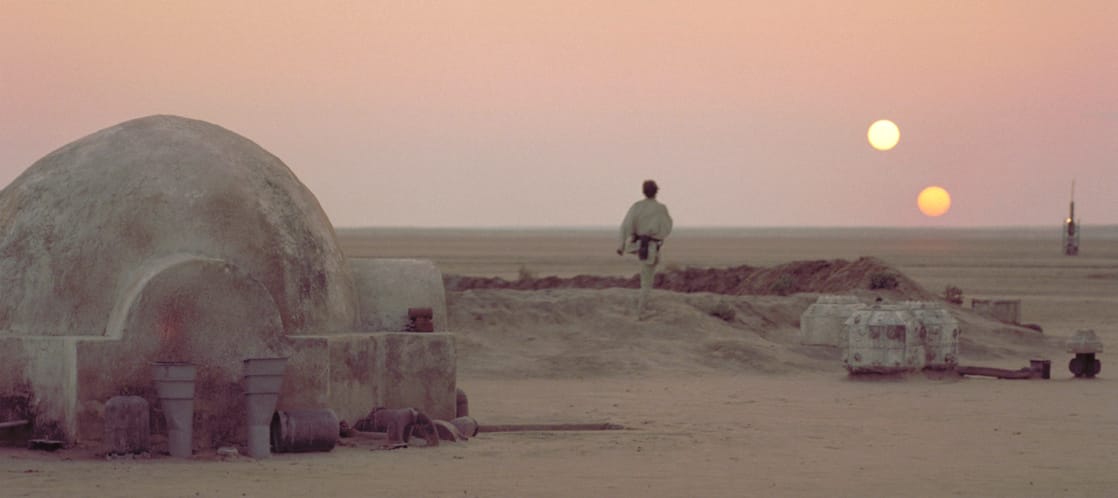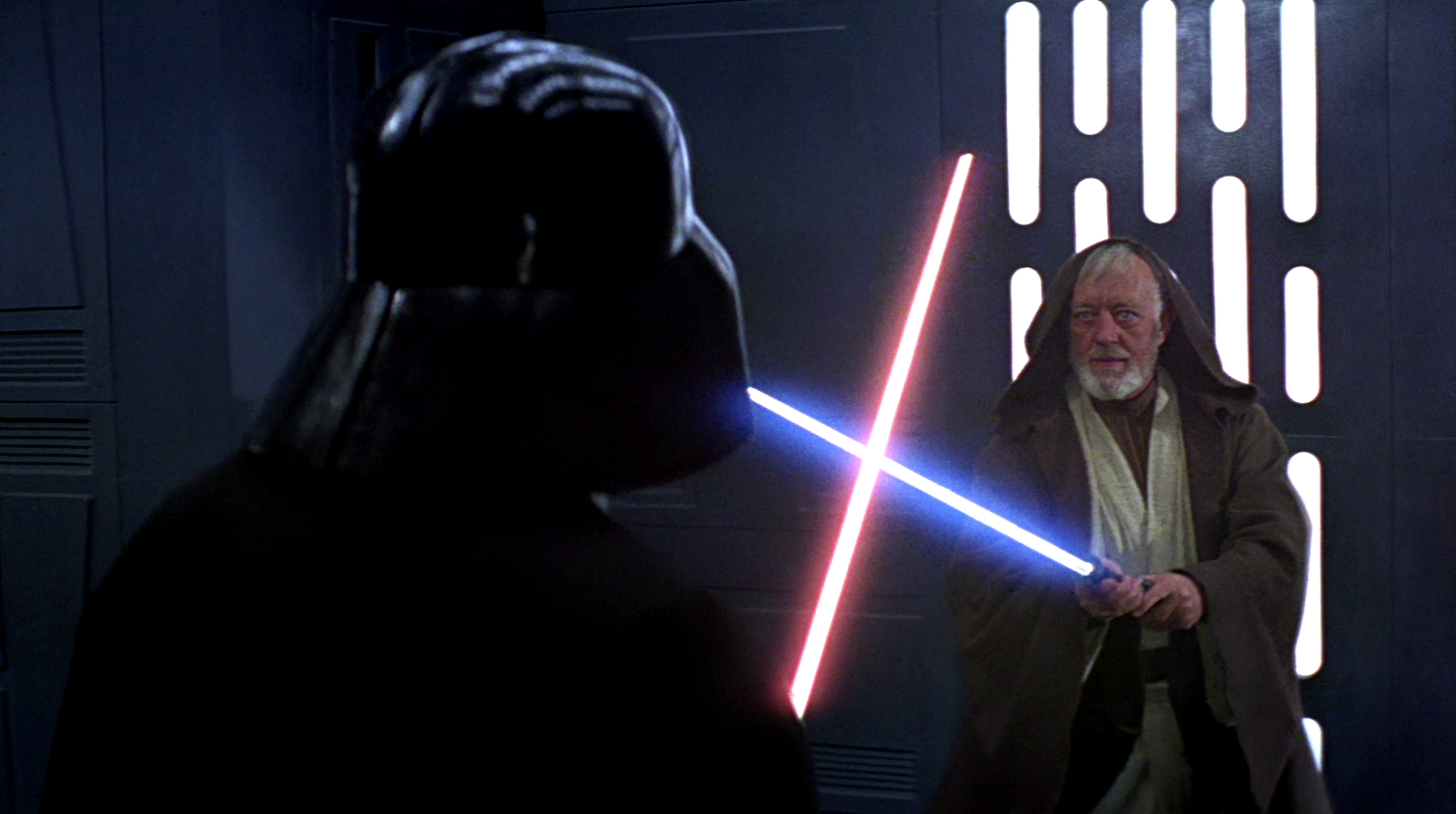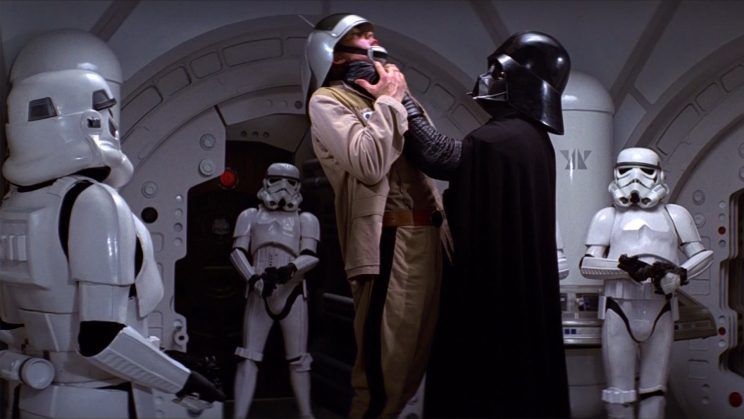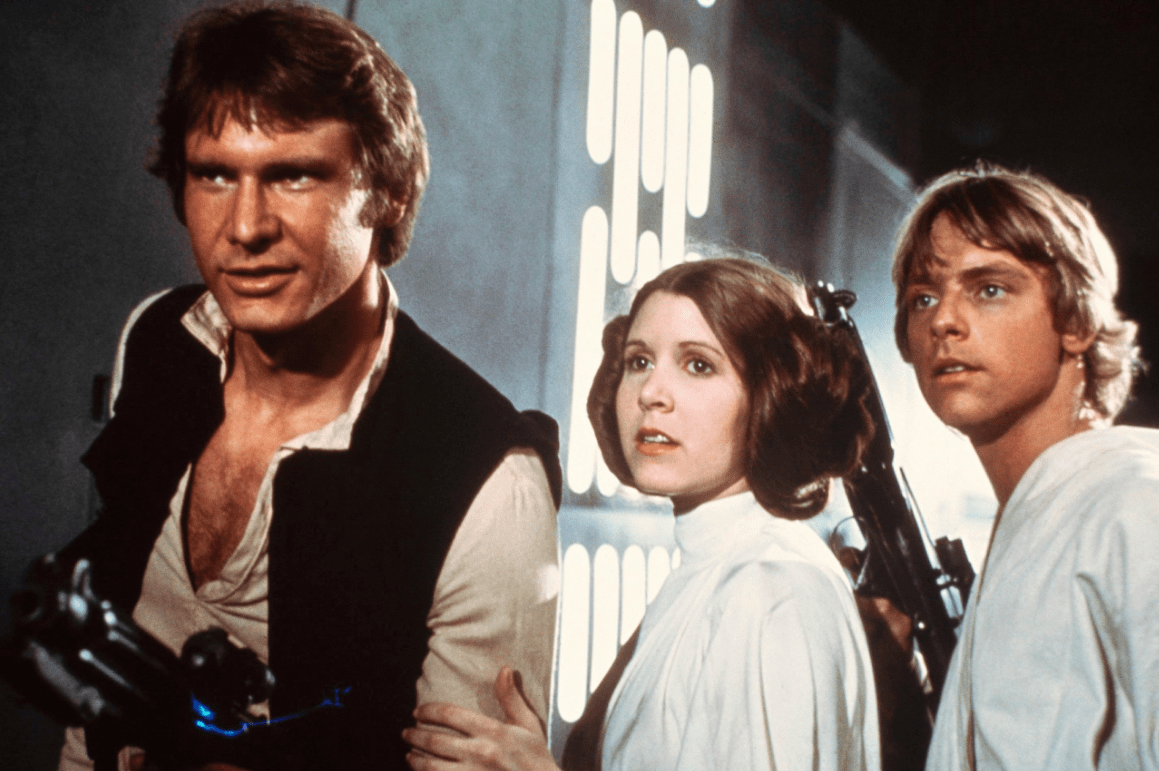- Director: George Lucas
- Writer: George Lucas
- Starring: Mark Hamill, Carrie Fisher, Harrison Ford, Alec Guinness, Peter Cushing, Anthony Daniels, Kenny Baker, Peter Mayhew, David Prowse, and James Earl Jones
- Accolades: AFI 2007 Top 100 list (#13), 7 Oscars (Best Original Score, Best Film Editing, Best Costumes, Best Production Design, Best Sound Mixing, Best Visual Effects, Special Achievement Award for Sounds Effects Editing), 4 additional Oscar nominations (Best Picture, Best Director – George Lucas, Best Supporting Actor – Alec Guinness, Best Original Screenplay)
- Where to Watch: Stream with subscription on Disney Plus, buy or rent on Amazon Video, YouTube, and Apple TV
I just waded through what seriously might be the longest article on Wikipedia, half of which is about whether George Lucas ever actually read The Hero With a Thousand Faces, and I still have no idea what I’m supposed to write about Star Wars that hasn’t been said seven trillion times before. This is a movie about which anyone with even a remote connection to the production has written a book, and started a franchise that has so far spawned eight more movies (I think I have that number right) along with one of the most talked-about current TV shows. Look, you can say what you want about Disney trying to milk Star Wars for all the content it can, and perhaps be angry about the Blockbusterization and Franchization and Commodification and all the other “ations” of Hollywood that this movie is more responsible for launching than any other, and wish that maybe Rian Johnson or Jon Favreau would be given a bazillion dollars to make his own, original sci-fi movie and not just a version of something else. Those are all valid points. But none of them changes the fact that Star Wars is a spectacularly great movie and the idea that it’s behind things like Raging Bull on the AFI Top 100 list (and not even on the more internationally respected Sight & Sound list) is frankly silly.
I am under 40, and do not know what it’s like to see Star Wars and be utterly destroyed by its awesomeness, but am also too old to be one of those people for whom the “prequel trilogy” has always been a fact of life. Star Wars has always existed, and will always exist. It has so heavily influenced so many other things that I’ve seen. Yet, watching it in close proximity to other classics, it’s easy to see how it barely recycles its influences while smooshing them together into something new. Large swathes of the plot are straight out of Kurosawa’s The Hidden Fortress (Lucas even offered the role of Obi-Wan Kenobi to Toshiro Mifune, who turned it down), the death star bombing run is cribbed fairly directly from the 1953 British war movie The Dam Busters, there are shots on Tatooine stolen straight from Lawrence of Arabia, and the bits where they’re running around the canyons hiding from the “natives” are from The Searchers. But just like a hip-hop track directly sampling from its influences, Star Wars felt new and different.

Hollywood was not into Science Fiction in the mid-70s, thinking its time was mostly over (essentially everyone involved with the production thought the movie was convinced it would be a major flop, with the possible exception of Alec Guinness, who took a percentage of the gross in lieu of salary and became stupidly rich as a result), but it seems that maybe that was because they hadn’t actually figured it out. Perhaps Lucas’ single biggest breakthrough came in seeing space as a normal place where people lived and worked, and took all the technology for granted. While past sci-fi had been guys dressed up in plastic uniforms in spaceships that looked like they were brand new, most of Star Wars is dusty and worn. It proved to be the little leap that grabbed the imaginations of kids everywhere.
George Lucas is usually credited as the mind behind the Star Wars juggernaut, though in most accounts of the behind the scenes story, he doesn’t come off particularly well. He revised the script over and over for a solid decade, seeming having little idea of what he actually wanted to do. His “final” version of the iconic opening scroll went on and on and on and was heavily edited by Brian DePalma, of all people. He never seemed to have any idea how to direct human actors, to the point that Princess Leia herself, Carrie Fisher, wrote that the only pieces of direction she ever got from him were “faster” or “more intense.” At one point during production, Lucas lost his voice, so the crew got him a board with just those two phrases, which he could point to. If the Prequel Trilogy taught us anything, it’s that Lucas loves all his toys but has no idea what to do with human actors. Somehow, during the original trilogy there was a sort of alchemy that helped things mostly work on that front that did not carry over to his later work.

Somehow, the cast of Star Wars, in a genre famed up until that time for its wooden performances, is mostly confident and natural. Despite what some may say, there are plenty of genuinely funny parts in the movie. It’s hard to tell whether the dialogue is genuinely great or just familiar, but when Alec Guinness calls Mos Eisley a “wretched hive of scum and villainy” it’s maybe the greatest description of anything in anything. It takes all the best bits of lots of great things and distills them down to their essence.
Star Wars, of course, on a pure financial level, became one of the most financially successful movies of all time, and far more successful as a font for making money in many other ways. Supposedly in 1985 there were more Star Wars toys in the world than there were citizens of the United States. It also, for the most part, took over the careers of everyone in it. Mark Hamill (who plays the heroic Luke Skywalker) was not able to be taken seriously in any other role for decades, but remade his career as a respected voice actor in animation and eventually fully reinvented himself. When the producers of 1983 Best Picture winner Amadeus considered casting him in the title role, the studio exec in charge of the project supposedly put his foot down. He wasn’t casting freaking Luke Skywalker as Mozart, so the part went to Tom Hulce. Carrie Fisher had a few larger roles over the years, but made more of a public career out of being Carrie Fisher. Behind the scenes, she broke into screenwriting after adapting her own novel, Postcards From the Edge, and went on to become one of Hollywood’s best paid “script doctors,” brought in to do uncredited work on many well known movies. Harrison Ford, who is the most fun in the movie as the rascally smuggler Han Solo, escaped being typecast after Lucas convinced Steven Spielberg to put him in their mutual project as Indiana Jones.
David Prowse plays the movie’s iconic villain, Darth Vader, a role that came to define his career as well, despite the fact that neither his face nor his voice are in the movie. After hearing his West Country accent, most of the crew agreed he couldn’t provide the voice for a scary villain, so Lucas cast James Earl Jones. At first, Jones refused to be credited, because he considered his voicework to be so minor. It wasn’t. But Prowse had the unique experience of playing one of the most famous movie roles of all time, but still being able to walk down any street in the world unaccosted. He passed away last month at the age of 85.

I suppose I should mention the issue of the later editions of this movie, which is what you’ll see today on pretty much any home video release or on Disney Plus. Lucas, ever the tinkerer, put in a bunch of CGI in the new “Special Editions” in order to “improve them.” Nearly all of the additions to this movie are completely unnecessary, but it’s also very clear where they are, so you can sort of nod your head and go “Ok, fine.” There is at least one completely added scene in which a CGI Jabba the Hutt comes to visit Han, which was originally shot with a human actor playing Jabba. The scene proved to be unusable when the Jabba actor was entirely out of focus, but Lucas puts the CGI creature over the actor (Jabba appeared as an enormous stop-motion puppet in The Return of the Jedi, so it had since been established he was a weird alien dude). As with the rest, it’s mostly unnecessary, but it’s an interesting bit of movie history.
Look, sometimes people say they don’t like Star Wars. I think what they don’t like is the idea of Star Wars. And that’s fine, but it’s not the same thing. Star Wars has had many negative effects over the infinite span of its pop culture life, but for the most part it’s not the fault of this crazy thing that started out as a labor of love, and is really, really great.


I think I am fine with the idea of Star Wars. Have I not watched the Baby Yoda show with you? But if I cannot stay awake through a movie, I feel like I am entitled to say that I do not like it. I have slept through six Star Wars movies, and therefore did not enjoy them, which to me is the same thing as not liking them. The two newer movies we saw were fine, probably more so for me because I have no nostalgia or attachment to the franchise as many others do.
LikeLike
You are much more persistent than I would have been, I probably would have quit after sleeping through about two of them! And I was talking much more about the film snobs of the world who disparage Star Wars than those like you that prefer other sci-fi, sorry for any implication!
LikeLike
Carrie Fisher went on to be much more than Carrie Fisher. In addition to being a wonderful writer and novelist, she was one of the biggest script doctor’s in Hollywood, saving such films like Sister Act, The River Wild, Lethal Weapon 3, and more.
LikeLiked by 1 person
That’s true. I meant to include that info but I always end up leaving things out!
LikeLike
“the death star bombing run is cribbed fairly directly from the 1953 British war movie The Dam Busters…”
Well, yeah, and Thirty Seconds Over Tokyo.
“…the bits where they’re running around the canyons hiding from the ‘natives’ are from The Searchers.”
The bit where Luke returns home to find his aunt and uncle dead was inspired by a similar scene in The Searchers. But no one in The Searchers ran around canyons “hiding from natives.” They were trying to find the Comanche, not get away from them.
LikeLike